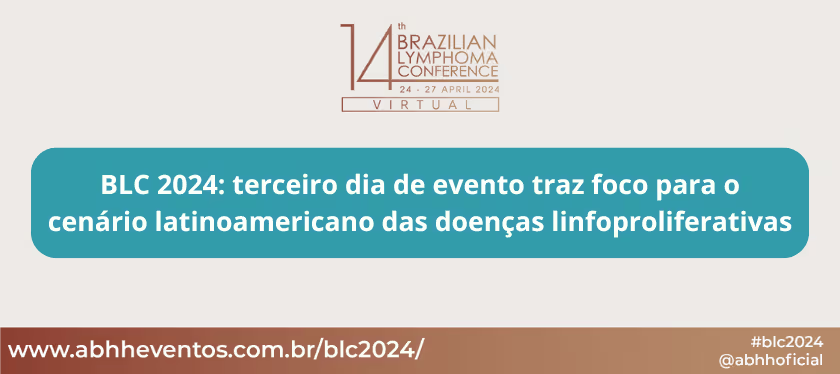The third day of the 14th Brazilian Lymphomas Conference, BLC 2024, opened space in the program for debates related to Hodgkin Lymphoma, with Drs. Paul Bröckelmann and Alisson Moskowitz, in the first presentations this Friday. During the first question and answer session this Friday (26), specialist Talita Silveira emphasized: “We are moving towards a moment of sufficient healing for first-line patients.”
Cutting the analysis to the scenario of Latin American countries, the American Luis Malpica Castillo emphasized that collaboration between organized lymphoma study groups is fundamental to the advancement of clinical studies in Latin America. As an example, Malpica cited groups that study the epidemiological aspects of lymphomas in Latin America, especially looking at population diversities, such as Afro-indigenous peoples.
Later, in a new question and answer session, the event's president, Dr. Carlos Chiattone, expressed great satisfaction in having a Latin American study group on lymphoproliferative diseases. “Although Latin America is very heterogeneous, from a phenotypic and financial point of view, many countries have managed to solve the local problems of diagnosis and treatment of lymphomas,” he said alongside Henry Idrobo-Quintero (COL), Thais Fischer and Malpica.
Access to new therapies for onco-hematological diseases
In the last session this Friday (26), the Director of Social Actions of ABHH, Dr. Jorge Vaz, gave an overview of the Association's performance in the Access scenario. “The inclusion of Blinatumumab in the public system marks a milestone in this journey, as well as the open public consultation at the time for the incorporation of Ibrutinib into LLC,” she revealed while also celebrating the unprecedented call for ABHH to contribute to the preparation of the Multiple Myeloma PCDT.
In the debate after the presentation of the Director of Social Actions, Dr. Carmino Antonio de Souza participated and added: “The concepts that ABHH adopted in the aspect of access to new technologies in the public system reflect our role that goes beyond the scientific-educational role, which is to contribute and star in attempts to improve the patient's life and promote equity”.
Dr. Jorge Vaz added that the collegial work between the new Social Actions Board in synergy with the technical committees supports the ABHH journey to identify where the biggest gaps are, with regard to our “choices” between supporting acquisitions between the public and private systems.
At the end of the debate and the day, the president of ABHH, Dr. Angelo Maiolino, recalled that the Association's political activities are currently a very important aspect. “When we engage in the political debate, we also have the opportunity to give an opinion on budget decisions and contribute to the construction of the National Policy for the Control and Fight against Cancer,” he concluded









